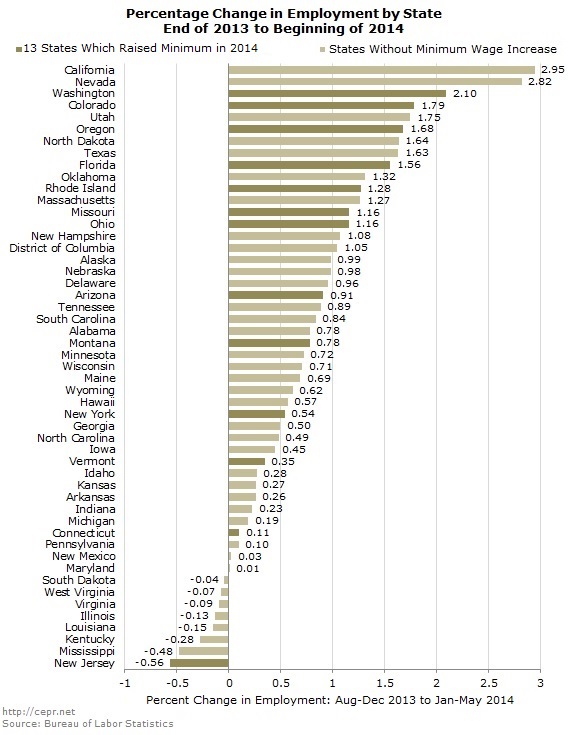The pragmatic approach to an answer is to carefully examine the canonical research on the topic. A sampling of such research is found below.
While conclusions from such research are ambivalent, an increasing proportion of studies are finding that the effects are generally more positive than negative. I suspect that a lot depends on the particular state of an economy when a minimum wage is raised - and how far it is raised. I have yet to find any studies that address this question directly, but I wonder whether, in contexts where capital is inexpensive, raises in minimum wages have more beneficial effects than where capital is expensive.
If forced to take a stance based on what I know now, I would advocate for a modest increase in the minimum wage.
Here are some important studies and summaries for the debate:
1) In a recent CEPR study of US states that raised their minimum wages in 2014:
"GS compared the employment change between December and January in the 13 states where the minimum wage increased with the changes in the remainder of the states. The GS analysis found that the states where the minimum wage went up had faster employment growth than the states where the minimum wage remained at its 2013 level."
http://www.cepr.net/blogs/cepr-blog/2014-job-creation-in-states-that-raised-the-minimum-wage
2) In a CBO study published in Feb 2014 on the effect of raising the federal minimum wage:
3) Journalist's Resource provides an excellent summary of the most prominent research:
http://journalistsresource.org/studies/economics/inequality/the-effects-of-raising-the-minimum-wage
http://journalistsresource.org/studies/economics/inequality/the-effects-of-raising-the-minimum-wage
4) Politicfact.com, in fact checking a claim made by Ben Cardin, provides an excellent summary of different studies and concludes:
"We looked at nationwide employment data in the years following minimum wage increases since 1978, and sometimes there was job growth, and sometimes there was job loss. Modern research tends to show that raising the minimum wage has little significant impact -- positive or negative -- on employment."
"We looked at nationwide employment data in the years following minimum wage increases since 1978, and sometimes there was job growth, and sometimes there was job loss. Modern research tends to show that raising the minimum wage has little significant impact -- positive or negative -- on employment."
5) In 2010, The Institute for Research on Labor and Employment published a study which found:
"For cross-state contiguous counties, we find strong earnings
effects and no employment effects of minimum wage
increases."
6) A NBER paper from 2006 found that:
"Although the wide range of estimates is striking, the oft-stated assertion that the new minimum
wage research fails to support the traditional view that the minimum wage reduces the employment of
low-wage workers is clearly incorrect."
http://www.nber.org/papers/w12663.pdf
http://www.nber.org/papers/w12663.pdf
7) In 1998 the Economic Policy Institute published a study where:
"The principal findings are that:
* The 1996 and 1997 minimum wage increases raised the wages of almost 10 million workers. About 71% of these workers were adults and 58% were women. Just under half (46%) worked full time and another third worked 20 to 34 hours per week.
* The average minimum wage worker is responsible for providing more than half (54%) of his or her family’s weekly earnings.
* The two-stage increase disproportionately benefited low-income working households. Although households in the bottom 20% of the income distribution (whose average income is $15,728) receive only 5% of total family income, they received 35% of the benefits from the minimum wage increase.
* Four different tests of the two increases’ employment impact — applied to a large number of demographic groups whose wages are sensitive to the minimum wage — fail to find any systematic, significant job loss associated with the 1996-97 increases. Not only are the estimated employment effects generally economically small and statistically insignificant, they are also almost as likely to be positive as negative."


No comments:
Post a Comment